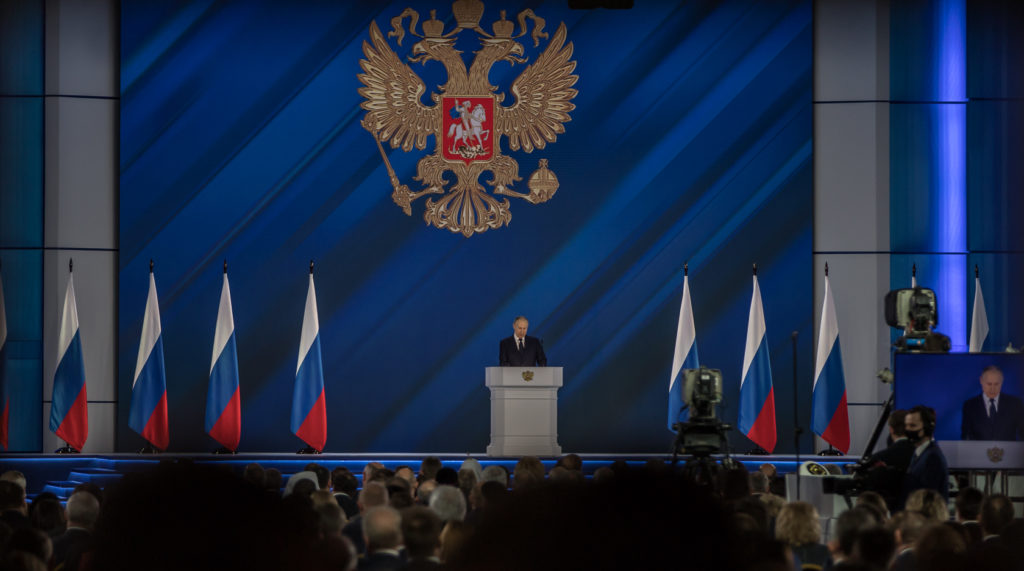By THE TRIBUNE staff
President Vladimir Putin blasted sanctions, warned the West against crossing “red lines” in its relations with Russia and said Moscow would respond in “rapid and harsh” fashion to hostile actions.
Putin made no direct reference to a mass military buildup on Ukraine’s border and in Crimea, annexed from Ukraine seven years ago, in his annual state-of-the-nation address to the Russian parliament.
But he was forthright in denouncing what he described as a coup and assassination attempt against his ally — veteran Belarusian leader Alexander Lukashenko — and repeated longstanding arguments that Ukraine’s 2014 “revolution of dignity” that ousted a Moscow-friendly president was a coup d’état.
“We don’t want to burn bridges, but if somebody interprets our good intentions as weakness, our reaction will be asymmetrical, rapid and harsh,” Putin told the gathering. “We’ll decide for ourselves in each case where the red line is.
“The organisers of any provocations against Russia will regret (their actions) in a way they never have before.”
Intelligence reports say more than 100,000 Russian troops are massed in Crimea and near areas in eastern Ukraine’s Donbass region seized in 2014 by proxies beholden to Moscow. Some 14,000 people have died in clashes since then. Military exercises are under way in the Black Sea and satellite photos have also shown the deployment of warplanes and other equipment.
Ukrainian President Volodymyr Zelensky, who has adopted a much tougher stand against Moscow two years after coming to power on pledges of doing a deal with Putin, said on the eve of Putin’s address that Russia was refusing all calls to sit down and talk about the deployment.
“And what am I to make of this? I spend time there every month,” Zelensky said in a video statement, switching from Ukrainian into Russian to address the Kremlin leader. “Mr. Putin! I am ready to go even further and propose a meeting with you at any place in Ukraine’s Donbass where the war is going on.
Zelensky says he now sees NATO membership as the only way to resolve the conflict. That notion is viewed as unacceptable in Moscow, which says the current deployment was undertaken to counter aggressive moves by the Alliance.
U.S. President Joe Biden imposed new sanctions on Moscow last week in response to events in Ukraine and allegations of meddling in U.S. elections. European capitals have issued denunciations but stopped short of new punitive measures – with Germany, in particular, worried about effects on the Nord Stream 2 pipeline meant to carry Russian gas to Europe.
Washington and Moscow each expelled a number of diplomats. The Czech Republic raised the stakes by making its own expulsion of Russian diplomats on allegations of espionage.
Invasion unlikely, report says
A report issued on Wednesday by the International Crisis Group said a full-scale invasion of Ukraine was unlikely.
“Despite the Russian tanks being ferried toward the border, there appears to be little likelihood of an imminent resurgence of the bloody fighting that shook Donbass…in 2014 and 2015. Troop numbers and postures, although worrying, do not fit the template for an invasion,” it said.
“That said, the troop build-up could set the stage for a standoff in which Ukraine has to choose between doing nothing in the face of repeated provocations and acting in response, which Moscow could take as an excuse to escalate further.”
In his address, Putin railed against “politically motivated, illegal sanctions”, adding that “this practice has now been transformed into something more dangerous – a direct attempt to stage a coup in Belarus and an attempt to assassinate that country’s president….”
Lukashenko, in control of his country’s affairs after a crackdown on mass protests against his re-election, said last week that a U.S.-backed coup attempt to unseat him had been foiled by Russian and Belarusian security services. He and Putin offered little evidence and activists in Belarus’s opposition said the allegations centred on Zoom discussion groups by Belarusian dissidents on how to confront the Belarusian leader, in office since 1994.
Lukashenko was due in Moscow on Thursday for talks with Putin, with subjects including progress in setting up a “union state” between the two neighbours, periodically backed by Lukashenko who, nonetheless, resists any notion of yielding his country’s sovereignty.

